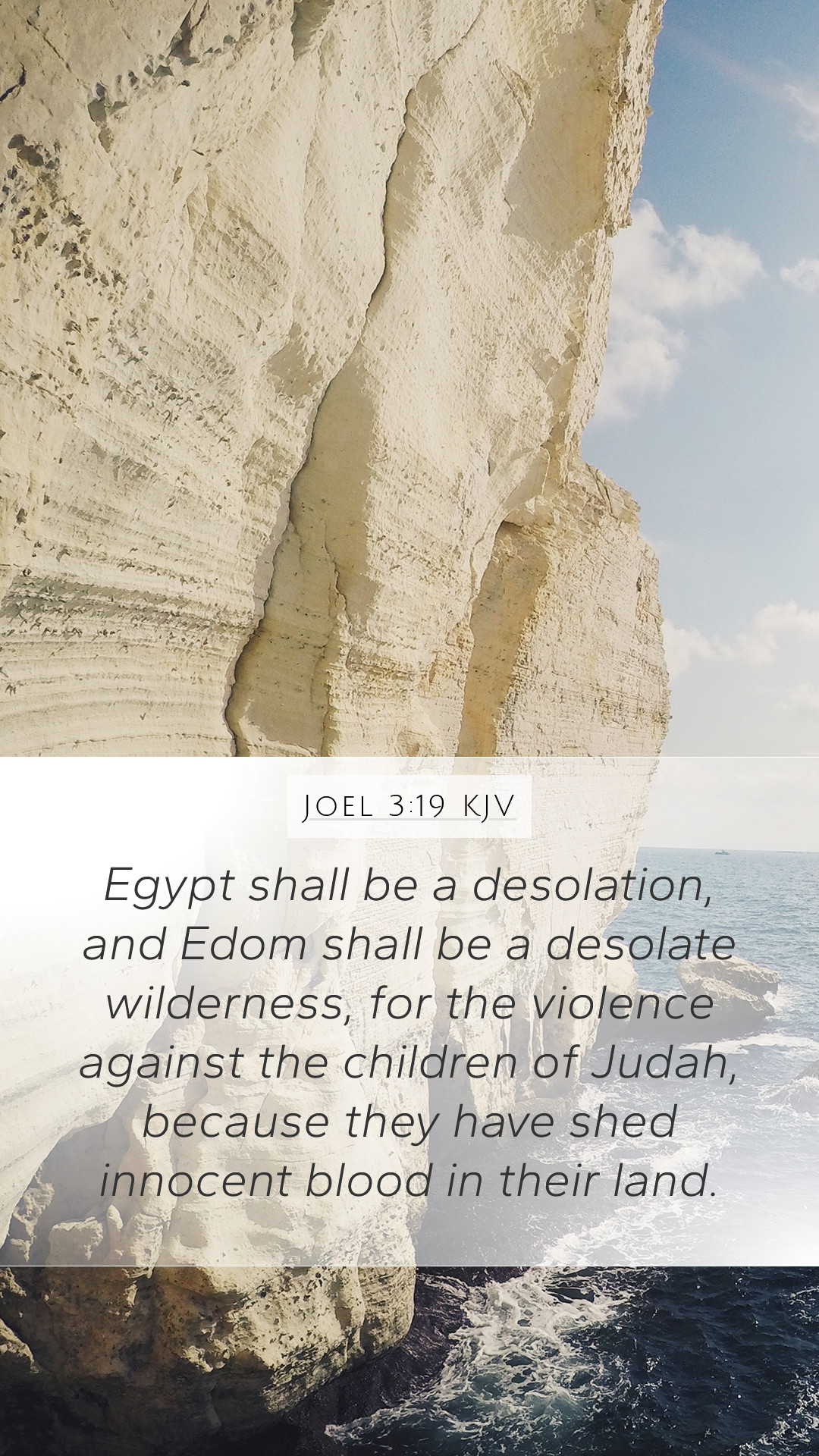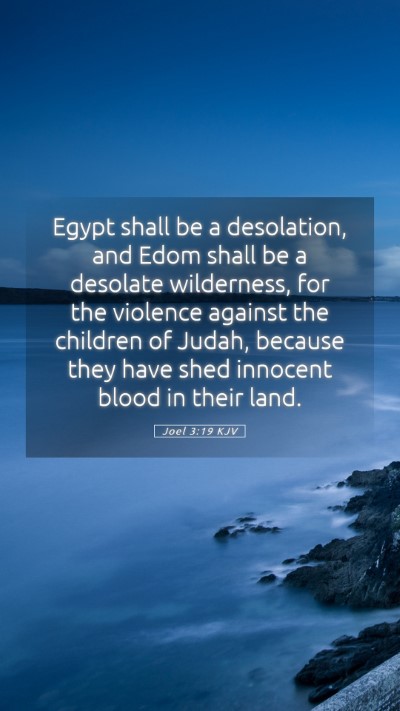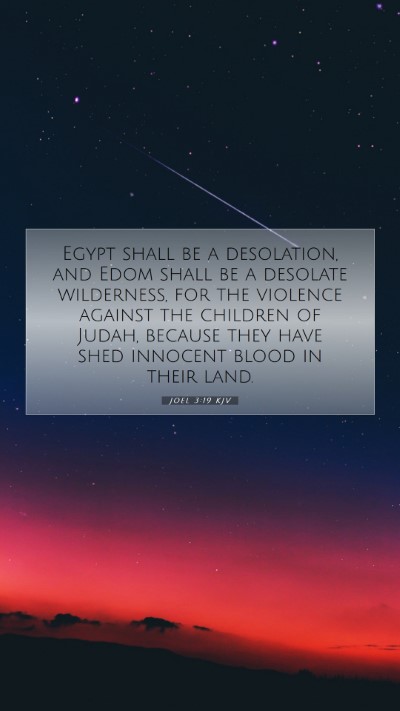Old Testament
Genesis Exodus Leviticus Numbers Deuteronomy Joshua Judges Ruth 1 Samuel 2 Samuel 1 Kings 2 Kings 1 Chronicles 2 Chronicles Ezra Nehemiah Esther Job Psalms Proverbs Ecclesiastes Song of Solomon Isaiah Jeremiah Lamentations Ezekiel Daniel Hosea Joel Amos Obadiah Jonah Micah Nahum Habakkuk Zephaniah Haggai Zechariah MalachiJoel 3:19 Meaning
What is the meaning of Joel 3:19?
Egypt shall be a desolation, and Edom shall be a desolate wilderness, for the violence against the children of Judah, because they have shed innocent blood in their land.
Joel 3:19 Bible Verse Meaning
Understanding Joel 3:19
Verse: Joel 3:19 - "Egypt shall be a desolation, and Edom shall be a desolate wilderness, for the violence against the children of Judah, because they have shed innocent blood in their land."
This verse is a part of the prophetic message from the prophet Joel, focusing on the impending judgment that God will bring against nations that have harmed His people, particularly Judah. The mention of Egypt and Edom underscores the historical animosities and the moral consequences of their actions against the Israelites.
Bible Verse Meaning and Context
In understanding this scripture, it is essential to consider its historical and theological context:
- Historical Background: Joel prophesied during a time when the people of Judah were facing great distress, notably following a locust plague. His messages reflect both present suffering and future hope, focusing on God's ultimate judgment and restoration.
- Thematic Significance: The verse conveys themes of justice and divine retribution. It indicates that nations that turn against God's chosen people, committing violence and injustice, will face desolation as judgment for their actions.
Bible Verse Interpretations from Public Domain Commentaries
Matthew Henry's Commentary
Matthew Henry emphasizes the certainty of God's judgment against those who inflict violence on His people. He notes that this prophecy serves as a reminder that nations like Egypt and Edom, historically adversarial toward Israel, will ultimately face desolation as a consequence of their actions. Henry highlights the moral lesson that the shedding of innocent blood invokes divine wrath, leading to both physical and spiritual desolation.
Albert Barnes' Notes on the Bible
Albert Barnes expands on the historical context by pointing out that Edom had often rejoiced in the miseries of Judah. He interprets the desolation of Egypt and Edom as a promise of God's justice, reflecting the principle that those who harm God's people will suffer greatly. Barnes notes that this prophetic declaration serves to assure the faithful that divine retribution against oppressors is inexorable and assures believers of God's ultimate sovereignty.
Adam Clarke's Commentary
Adam Clarke provides insights into the language and imagery used in this verse. He suggests that the "desolation" refers not only to physical ruins but also to spiritual abandonment. Clarke indicates that the shedding of innocent blood is a grievous sin that brings severe consequences, inviting readers to reflect on the moral implications of violence and injustice in their own lives and communities.
Theological Implications
The theological implications of Joel 3:19 are broad and significant:
- Divine Justice: This verse asserts God’s role as the ultimate judge who responds to the injustices committed against His people.
- Consequences of Sin: It illustrates the serious consequences that accompany sin, particularly violence against the innocent.
- Hope for the Oppressed: For those suffering injustice, this verse serves as a promise that God will not overlook wrongdoings but will bring about justice in His time.
Applying the Verse to Daily Life
In applying Joel 3:19 to contemporary life, consider how the principles of justice and accountability resonate today:
- Awareness of Injustice: Recognizing instances of violence and oppression in our surroundings motivates us to advocate for justice.
- Reflection on Actions: This verse encourages personal reflection on how our actions may contribute to or alleviate the suffering of others.
- Restoration and Hope: Believing in God’s overarching justice can provide comfort to those who struggle against wrongdoing.
Cross References
Joel 3:19 correlates with several other scriptural passages:
- Isaiah 34:5-6 - Discusses judgment against Edom.
- Lamentations 3:34-36 - Speaks to God's justice and the wrongful actions against His people.
- Revelation 6:10 - The souls of the slain cries out for justice.
Conclusion
Joel 3:19 serves as a powerful reminder of God’s justice and His commitment to the oppressed. By understanding its meaning through various commentaries, we gain insights that not only illuminate the historical context but also provide applicable lessons for our lives today. This verse encourages us to seek justice, reflect on our actions, and trust in God’s ultimate plan for restoration and judgment.


